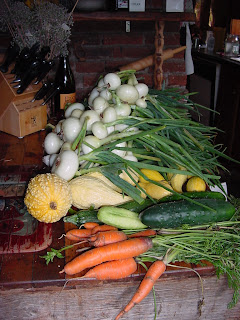Farm Days in July
+Aug+2007+028.jpg)
Does it ever really get that dark in summer because it sure seems as if the sun keeps coming up at around 4:00 a.m.? I resist rolling out of bed until at least 6:30, by which time the cat has walked across my back, the dog has stuck his smelly face in mine and given me a lick just for good measure, the horses are starting to fidget and squeel in their paddock, lambs are crying out for their lost mothers, and, of course, the roosters have been crowing since 2:00!
Ah, the farm days of July, when despite an increase in activities, nothing ever feels fully completed. Take water, for instance. It's Oregon where people think it always rains. But we have a secret up here. It stops raining about mid June and doesn't start again until the middle of September. All the photos with green grass in the fields? Those are from the winter. If you look closely you will notice there are no leaves on the trees. The photos of brown fields. You guessed it - summertime. You may or may not have guessed the next part. When the fields are brown, our grazing animals are not happy and search the creek banks for any green leaf they can find. If farms are set up for it, and ours is, they will irrigate their pastures, either to grow a second cut of hay, or, in our instance, strive to make the animals less grumpy.
It's Greg's job, for the most part, to take care of moving our irrigation pipe because I have the bad habit of breaking it, and then everyone is mad. I'm not sure if he sees this as Zen therapy, but once the sun starts baking the earth he will go out first thing in the morning to move the 14 20' pipes in the hay field, open the valves, shut other valves, struggle with the Big Gun in the barn field so that it is moved and level, and then head down to the creek to prime and start the pump.
I help at the beginning and end of summer. In the late spring, Greg solicits my assistance loading the pump into the bucket of the tractor. We have stored it in the barn over winter and the first thing to do is clean out all the mouse nests and bits of flotsom that have found their ways into the openings of the pipes. The pump weighs too much for either of us to lift more than 6" so we have to get the bucket under the majority of it and make sure as Greg raises it off the ground to look for parts that might get caught and break off. I also keep track of where I put my hands.
Once down at creek side we have to remember how to wire the pump into the main electrical panel, find a flat spot for it to rest, line up the intake pipes with existing pieces, and finally (and this is the tricky part) throw the washing machine basket into the deep part of the creek as we balance a 20' 4" pipe on its end to suck the water from the creek and out to our fields. It's pretty monstrous how much water we can actually move through the system - most evident when something blows up and water goes spewing all over the place. At the end of summer, I help with the reverse installation.
With added water come weeds. Besides taking care of the animals, our irrigation system waters the vegetable gardens, the flower gardens, the lawn, and anything else within reach of the 50 or so sprinkler heads we have on grounds. You all know I hate weeding. It wouldn't be so bad if they didn't come right back two-fold. So July days are filled with weeding as far as I'm concerned. Sure, there are veggies to pick, and fruits,and then the kitchen counters are filled to overflowing as I consider my expensive past-time of blanching and freezing, or cooking and canning, to preserve all the bounty for the winter, and maybe next year, and maybe the year after. No wonder farm wives didn't have jobs out of the house. They could never get out of the house except to pick more veggies and fruit!
But, July days, with all the goings on between the animals and the growing things and the water and the heat of the sun, is a bountiful time of warmth and the rich smell of the earth. The wasps buzz around the eves of the house looking for a place to create a paper hive as we sit back on the deck at the end of a long day with a cold beer and maybe a friend or two who have helped with our massive endeavors. It really takes a village to run a farm, not a pair of 50 year olds. We are still doing things because we can, or maybe to prove we can, not because we absolutely need to. It's time to make a decision for the next summer whether it is worth stocking in 100 pounds of potatoes or freezing 25 bags of corn, both of which took considerable time from beginning to end. Small farming is inefficient in the modern world, but do I get just a little joy and satisfaction knowing where my food comes from and what was or was not put in the soil? It's a bit like trading my best friends in Arizona for the more habitable climate of Oregon. The end result is bittersweet.+Aug+2007+044.jpg)
Top photo: Produce in the kitchen
Bottom photo: Greg moving pipe in the hayfield
All Rights Reserved. Copyright 2007 Scottie Jones